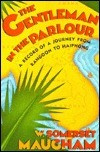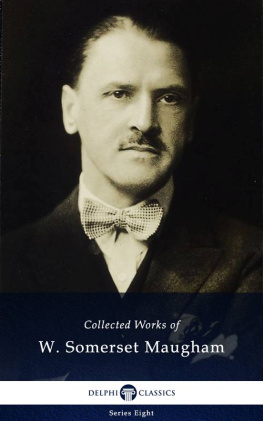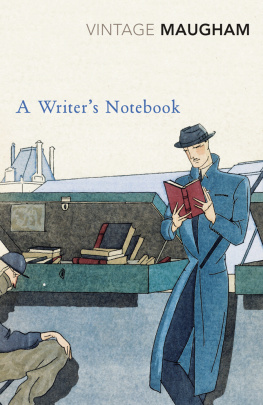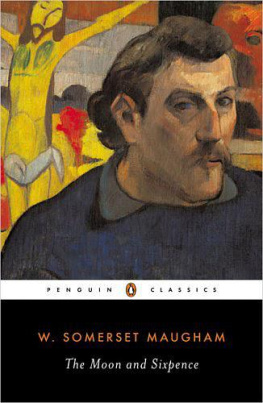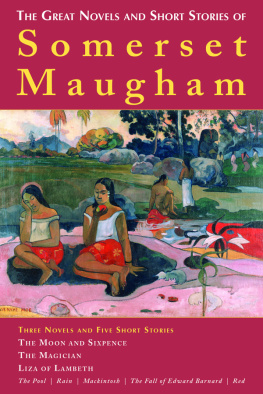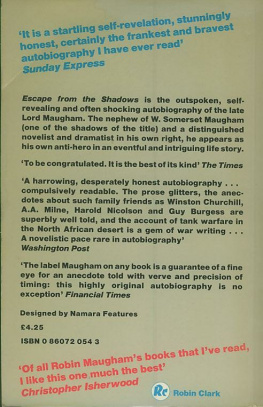W. Maugham - Selected Masterpieces
Here you can read online W. Maugham - Selected Masterpieces full text of the book (entire story) in english for free. Download pdf and epub, get meaning, cover and reviews about this ebook. genre: Prose. Description of the work, (preface) as well as reviews are available. Best literature library LitArk.com created for fans of good reading and offers a wide selection of genres:
Romance novel
Science fiction
Adventure
Detective
Science
History
Home and family
Prose
Art
Politics
Computer
Non-fiction
Religion
Business
Children
Humor
Choose a favorite category and find really read worthwhile books. Enjoy immersion in the world of imagination, feel the emotions of the characters or learn something new for yourself, make an fascinating discovery.

Selected Masterpieces: summary, description and annotation
We offer to read an annotation, description, summary or preface (depends on what the author of the book "Selected Masterpieces" wrote himself). If you haven't found the necessary information about the book — write in the comments, we will try to find it.
W. Maugham: author's other books
Who wrote Selected Masterpieces? Find out the surname, the name of the author of the book and a list of all author's works by series.
Selected Masterpieces — read online for free the complete book (whole text) full work
Below is the text of the book, divided by pages. System saving the place of the last page read, allows you to conveniently read the book "Selected Masterpieces" online for free, without having to search again every time where you left off. Put a bookmark, and you can go to the page where you finished reading at any time.
Font size:
Interval:
Bookmark:
W. Somerset Maugham
Selected Masterpieces
German Harry
I was in Thursday Island and I wanted very much to go to New Guinea. Now the only way in which I could do this was by getting a pearling lugger to take me across the Arafura Sea. The pearl fishery at that time was in a bad way and a flock of neat little craft lay anchored in the harbour. I found a skipper with nothing much to do (the journey to Merauke and back could hardly take him less than a month) and with him I made the necessary arrangements. He engaged four Torres Straits islanders as crew (the boat was but nineteen tons) and we ransacked the local store for canned goods. A day or two before I sailed a man who owned a number of pearlers came to me and asked whether on my way I would stop at the island of Trebucket and leave a sack of flour, another of rice, and some magazines for the hermit who lived there.
I pricked up my ears. It appeared that the hermit had lived by himself on this remote and tiny island for thirty years, and when opportunity occurred provisions were sent to him by kindly souls. He said that he was a Dane, but in the Torres Straits he was known as German Harry. His history went back a long way. Thirty years before, he had been an able seaman on a sailing vessel that was wrecked in those treacherous waters. Two boats managed to get away and eventually hit upon the desert island of Tre-bucket. This is well out of the line of traffic and it was three years before any ship sighted the castaways. Sixteen men had landed on the island, but when at last a schooner, driven from her course by stress of weather, put in for shelter, no more than five were left. When the storm abated the skipper took four of these on board and eventually landed them at Sydney. German Harry refused to go with them. He said that during those three years he had seen such terrible things that he had a horror of his fellow-men and wished never to live with them again. He would say no more. He was absolutely fixed in his determination to stay, entirely by himself, in that lonely place. Though now and then opportunity had been given him to leave he had never taken it.
A strange man and a strange story. I learned more about him as we sailed across the desolate sea. The Torres Straits are peppered with islands and at night we anchored on the lee of one or other of them. Of late new pearling grounds have been discovered near Trebucket and in the autumn pearlers, visiting it now and then, have given German Harry various necessities so that he has been able to make himself sufficiently comfortable. They bring him papers, bags of flour and rice, and canned meats. He has a whale boat and used to go fishing in it, but now he is no longer strong enough to manage its unwieldy bulk. There is abundant pearl shell on the 4 reef that surrounds his island and this he used to collect and sell to the pearlers for tobacco, and sometimes he found a good pearl for which he got a considerable sum. It is believed that he has, hidden away somewhere, a collection of magnificent pearls. During the war no pearlers came out and for years he never saw a living soul. For all he knew, a terrible epidemic had killed off the entire human race and he was the only man alive. He was asked later what he thought.
"I thought something had happened," he said.
He ran out of matches and was afraid that his fire would go out, so he only slept in snatches, putting wood on his fire from time to time all day and all night. He came to the end of his provisions and lived on chickens, fish and coconuts. Sometimes he got a turtle.
During the last four months of the year there may be two or three pearlers about and not infrequently after the day's work they will row in and spend an evening with him. They try to make him drunk and then they ask him what happened during those three years after the two boat-loads came to the island. How was it that sixteen landed and at the end of that time only five were left? He never says a word. Drunk or sober he is equally silent on that subject and if they insist grows angry and leaves them.
I forget if it was four or five days before we sighted the hermit's little kingdom. We had been driven by bad weather to take shelter and had spent a couple of days at an island on the way. Trebucket is a low island, perhaps a mile round, covered with coconuts, just raised above the level of the sea and surrounded by a reef so that it can be approached only on one side. There is no opening in the reef and the lugger had to anchor a mile from the shore. We got into a dinghy with the provisions. It was a stiff pull and even within the reef the sea was choppy. I saw the little hut, sheltered by trees, in which German Harry lived, and as we approached he sauntered down slowly to the water's edge. We shouted a greeting, but he did not answer. He was a man of over seventy, very bald, hatchet-faced, with a grey beard, and he walked with a roll so that you could never have taken him for anything but a sea-faring man. His sunburn made his blue eyes look very pale and they were surrounded by wrinkles as though for long years he had spent interminable hours scanning the vacant sea. He wore dungarees and a singlet, patched, but neat and clean. The house" to which he presently led us consisted of a single room with a roof of corrugated iron. There was a bed in it, some rough stools which he himself had made, a table, and his various household utensils. Under a tree in front of it was a table and a bench. Behind was an enclosed run for his chickens.
I cannot say that he was pleased to see us. He accepted our gifts as a right, without thanks, and grumbled a little because something or other he needed had not been brought. He was silent and morose. He was not interested in the news we had to give him, for the outside world was no concern of his: the only thing he cared about was his island. He looked upon it with a jealous, proprietary right; he called it "my health resort" and he feared that the coconuts that covered it would tempt some enterprising trader. He looked at me with suspicion. He was sombrely curious to know what I was doing in these seas. He used words with difficulty, talking to himself rather than to us, and it was a little uncanny to hear him mumble away as though we were not there. But he was moved when my skipper told him that an old man of his own age whom he had known for a long time was dead.
"Old Charlie dead-that's too bad. Old Charlie dead."
He repeated it over and over again. I asked him if he read.
"Not much," he answered indifferently.
He seemed to be occupied with nothing but his food, his dogs and his chickens. If what they tell us in books were true his long communion with nature and the sea should have taught him many subtle secrets. It hadn't. He was a savage. He was nothing but a narrow, ignorant and cantankerous seafaring man. As I looked at the wrinkled, mean old face I wondered what was the story of those three dreadful years that had made him welcome this long imprisonment. I sought to see behind those pale blue eyes of his what secrets they were that he would carry to his grave. And then I foresaw the end. One day a pearl fisher would land on the island and German Harry would not be waiting for him, silent and suspicious, at the water's edge. He would go up to the hut and there, lying on the bed, unrecognisable, he would see all that remained of what had once been a man. Perhaps then he would hunt high and low for the great mass of pearls that has haunted the fancy of so many adventurers. But I do not believe he would find it: German Harry would have seen to it that none should discover the treasure, and the pearls would rot in their hiding place. Then the pearl fisher would go back into his dinghy and the island once more be deserted of man.
The Three Fat Women of Antibes
One was called Mrs. Richman and she was a widow. The second was called Mrs. Sutcliffe; she was American and she had divorced two husbands. The third was called Miss Hickson and she was a spinster. They were all in the comfortable forties and they were all well off. Mrs. Sutcliffe had the odd first name of Arrow. When she was young and slender she had liked it well enough. It suited her and the jests it occasioned though too often repeated were very flattering; she was not disinclined to believe that it suited her character too: it suggested directness, speed and purpose. She liked it less now that her delicate features had grown muzzy with fat, that her arms and shoulders were so substantial and her hips so massive. It was increasingly difficult to find dresses to make her look as she liked to look. The jests her name gave rise to now were made behind her back and she very well knew that they were far from obliging. But she was by no means resigned to middle age. She still wore blue to bring out the colour of her eyes and, with the help of art, her fair hair had kept its lustre. What she liked about Beatrice Richman and Frances Hickson was that they were both so much fatter than she, it made her look quite slim; they were both of them older and much inclined to treat her as a little young thing. It was not disagreeable. They were good-natured women and they chaffed her pleasantly about her beaux; they had both given up the thought of that kind of nonsense, indeed Miss Hickson had never given it a moment's consideration, but they were sympathetic to her flirtations. It was understood that one of these days Arrow would make a third man happy.
Font size:
Interval:
Bookmark:
Similar books «Selected Masterpieces»
Look at similar books to Selected Masterpieces. We have selected literature similar in name and meaning in the hope of providing readers with more options to find new, interesting, not yet read works.
Discussion, reviews of the book Selected Masterpieces and just readers' own opinions. Leave your comments, write what you think about the work, its meaning or the main characters. Specify what exactly you liked and what you didn't like, and why you think so.



